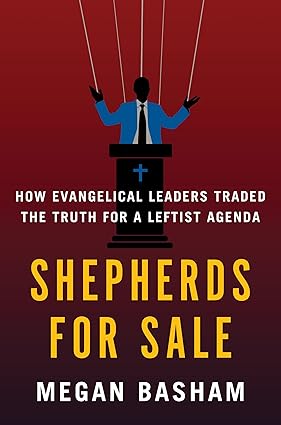
Shepherds for Sale is an important book, and I am delighted to commend it to you. The adage “follow the money” is always a good one to remember when it comes to issues like this, and this is exactly what Megan Basham does. She follows the money and it reveals quite a tale of sad theological compromise. As I am fond of saying, you can’t keep money from doing what money always does.
The book begins with the issue of climate change, which delighted me because of how this highlights the stark difference in how the evangelical left treats different political issues. When the issue is a foundational moral issue with political ramifications, like the right to life, conservative Christians are frequently warned that they might be making conservative politics into an idol, and that being pro-life has to be approached in a more holistic way, by which is meant something like minimum wage laws. And all this, because the activist in question is opposed to the dismemberment of children in the womb, and the subsequent selling of the pieces. In other words, this is a moral issue simpliciter. But when it comes to temperature changes a century or two out from us, which we may or may not be causing, and if it is happening, we are not sure the effects will be negative, and if we are causing it, we are not sure we can do anything about it, this is apparently an issue with clear moral imperatives attached, and becomes a simple matter of “loving your neighbor.” Apparently not political at all. Loving your neighbor apparently means wholesale acceptance of statist propaganda along with increased taxes to fix the weather, while loving your unborn neighbor veers dangerously close to idolatry of the family.
The crux of this book’s argument is the money. The only effective way to challenge the book’s thesis would be to show that all these leftist atheistic funding organizations did not give boatloads of money to evangelical organizations at all. If they did give the money, and they did, then the most reasonable question in the world to ask is why? What were they hoping to get from this investment, and did they get it? If they did not get it, then why did they continue to give the money? If they did get it, then Megan Basham can just sit back and say something along the lines of Q.E.D. Now I happen to believe the flow of money would be problematic even if there were no apparent leftward drift in the views of our evangelical poobahs. But it is really problematic when we can see the pronounced leftward drift of the evangelical leaders, which we can. This is a book that cries out for a responsible and serious discussion.
A quick note on the dust up surrounding the book’s release. Given the flurry of lawyerly letters trying to prevent publication, and the decision of the publisher to proceed anyhow, and given the nature of the thesis of the book, it was only to be expected that there would be protests upon publication—i.e. that Megan Basham had done sloppy work with regard to the views of this person or that one. This is exactly what happened when Gavin Ortlund responded almost immediately with the claim that he had been misrepresented. But then, before she had a chance to answer, others (like Timon Cline) showed up with evidence that she had not been slipshod in her work at all. Go ahead and read this kind of back and forth (Prov. 18:17), but don’t let the online churn keep you from getting and reading the book. It really is an important book, and promises to explain a lot. At the time of this writing it was #23 at Amazon for all books, which is . . . formidable. What is needed here is real debate and serious interaction, not deflection.
And here is a crucial postscript: this is where I would want to put my judicious foot forward, and I do have one, believe it or not. Some are taking the view that any criticism of this book whatever “outs one as a lib,” and I do think that this is a tad too strict. I would say, and I know that Meg Basham would agree, that fair-minded criticism only outs you as being fair-minded. But “circle the wagons criticism of the book,” however, would out you as a lib, or as someone carrying water for the libs for some reason.
As indicated earlier, getting the book would be a great thing to do right now.

